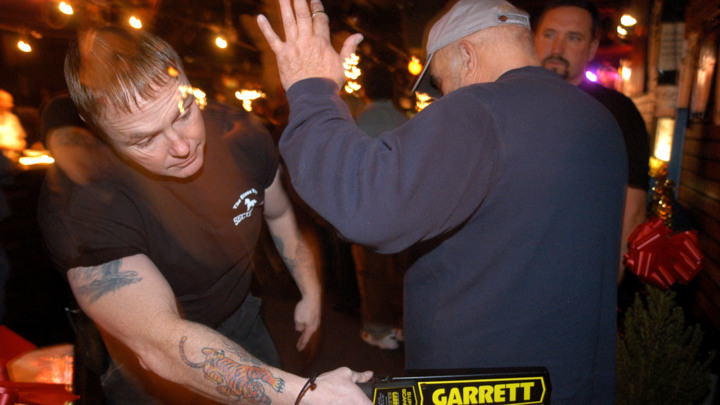
In 2004, former Marine Nathan Gale walked onstage at Columbus, Ohio’s Alrosa Villa minutes into heavy metal band Damageplan’s set and shot and killed former Pantera guitarist “Dimebag” Darrell Abbott. Following the musician’s death, the concert business vowed change to better protect fans and artists from violence inside venues. Twelve years later, with little changed, 22-year-old singer Christina Grimmie met a similar, tragic fate after performing at Orlando’s The Plaza Live, when obsessed fan Kevin Loibl murdered her before killing himself at a post-show meet-and greet
Darrell AbottAre Concert Venues Any Safer After Dimebag Darrell’s Murder? »
At large venues like NFL stadiums and Disney theme parks, the industry has added additional metal detectors, more security and more thorough bag checks. But for thousands of smaller venues, concert security is generally what it was in 2004. “I’ve seen very little change,” says Steve Adelman, vice president of the Event Safety Alliance, a non-profit association of promoters, agents and managers aiming to “[eliminate] unsafe behaviors and conditions throughout our industry.” “As you get to smaller venues that have smaller budgets and less infrastructure, they do less.”
Gus Brandt, Florida-based tour manager of Foo Fighters and Pharrell Williams, is tired of waiting for the concert business to make sweeping changes. He also co-manages Blink-182, who are playing arenas this summer, and plans to “beef things up” — the band will travel with additional security and has already demanded more police via pre-negotiated security riders. “I’m doing that across the board with everybody I work with — Pharrell, the Foos,” he says. “No one wants to die on tour. And no one wants anyone to die for going out to have fun.
“It needs to be industry-wide. Everyone needs to take stock,” Brandt adds. “This is not directed to any particular venue, but some of your security that’s guarding your kids, and my artists and my crew, their sole training for security sometimes is putting on a T-shirt that says ‘security.’ The concert industry needs to react and adjust and come up with a plan — ‘this is what it’s like in an arena, this is what it’s like in a shed.’ Don’t give us your trainees, please. Every show’s the Super Bowl.”
Those measures may be relatively easy to change for stars, venues and promoters with big budgets, but it’s harder for artists like Grimmie, who had graduated from The Voice two years ago and was slowly getting bigger by building a live fanbase. “Does Christina, who’s producing these shows at this point of her career, have the ability to carry a competent and capable security person with her? Competency comes at a cost,” says Jim Digby, Linkin Park’s production director, who founded the Event Safety Alliance. “Operating on a shoestring budget, can the club afford a police presence? The answer to that is probably no.”
Sandy Hook Shooting Political Party contributions post RepublicansOne Big Reason the Latest Gun Bills Failed »
It’s still unclear how Omar Mateen, the ISIS follower and homophobic religious zealot, managed to bring an assault rifle and handgun into Orlando’s Pulse earlier this month, killing 49 people and injuring 53 in the most deadly mass shooting in U.S. history. “I don’t have all the details, but if it happens that quickly and they breach it that fast, it’s hard to stop it,” says Pete Beattle, co-owner of NPB, a Kansas City security management service that works with top artists tours and venues. “If he wouldn’t have been able to do it in the club, he would have done it in the street.”
Adelman suggests more awareness might have helped at the Pulse; security people towards the front of the building should have suspected something wrong when they saw a man in bulky clothes show up at closing time on a hot night. More security might have helped, he adds, regardless of the cost, in addition to metal detectors and pat-downs; in the case of the T.I. shooting in New York, which left one man dead and three others injured, security measures should have been extended to backstage personnel in addition to fans.
But the real solution is far above the nightclub jurisdiction. “Deal with the guns — that’s the answer,” Adelman says. “There has to be a solution that includes, ‘When someone’s on the FBI’s watchlist, they cannot purchase an AR-15 and body armor.’ It’s just stupid to have this conversation without including that.”
Original Article appeared on RollingStone.com
